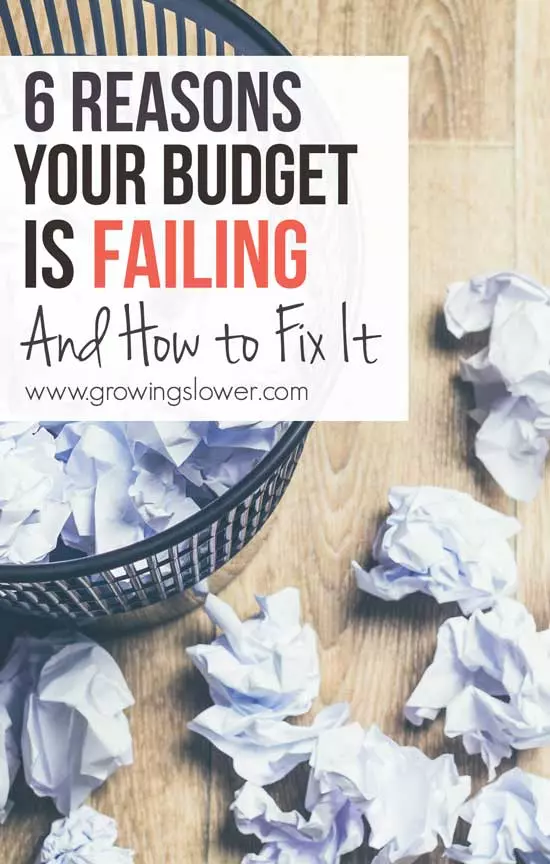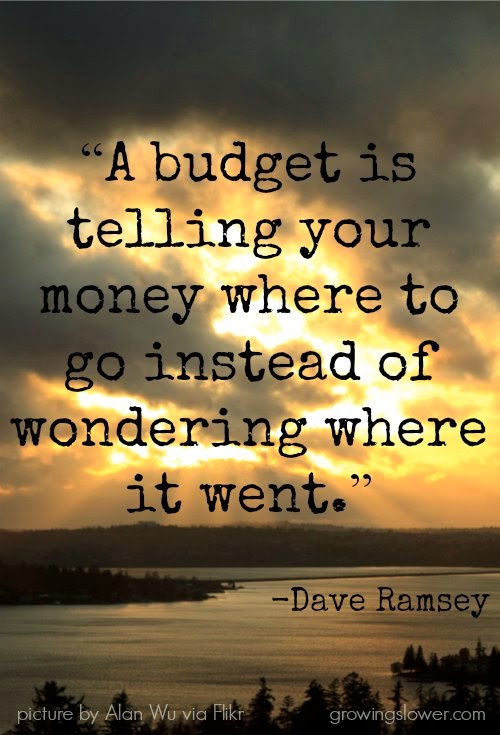If you’re sick of going over budget every month, make sure you’re not falling into one of these budgeting pitfalls. Instead, try these 6 ultra-simple tricks to learn how to stick to a budget at last.
There are about a million articles online about how to make a budget. (Ya, I’ve even written a couple too.) But we all know, it isn’t knowing how to make the budget that is the problem. It’s actually sticking to it – that’s the hard part!
My husband and I have learned financial stewardship the long and painful way over the years. We made our first family budget around the time that our first child was born. The first month that we were actually able to stick to it was just after he turned TWO YEARS OLD!
Apparently I can be slow to learn and maybe a tiny bit stubborn sometimes. But hopefully that means you can learn from our mistakes without so much pain on your part!
This post contains affiliate links to some budgeting resources I found helpful on my journey.
Why you can’t Stick to a Budget, and 6 simple ways to fix it
Here are the simple tricks we learned along the way that allowed us to FINALLY stick to a budget and pay off our debt fast. If you go over budget every month, I can almost guarantee there’s at least one of these six practices that you aren’t doing yet. It’s never too late to start!
Budget Mistake #1 – You budget for a ‘normal’ month.
When I started my budget, I thought I’d do it once and then follow it every month, but guess what! That ‘normal’ month never came. There were always things popping up outside of our regular monthly expenses that threw me over budget.
Here’s what I learned to do instead. Rather than making a theoretical budget for the perfect month that, um, never actually happens, make a new budget every month for the month ahead.
In other words, don’t make ‘A’ budget, make a January Budget, a February Budget, and so on.
This will help cut down on unexpected expenses because you only have to plan one month ahead. There’s no way you can see all the unusual changes to your income and expenses will happen this year. However, chances are you already have a fairly clear picture of what in the month ahead. That is what you should plan for in your monthly budget.
This is especially true for energy bills which are sent the month or so before they are due. You can also get a good idea of any upcoming medical costs when you receive your explanation of benefits ahead of getting the actual bill. This way you can plan ahead for any “surprise” expenses for the upcoming month.
If you know you’re going to have to spend more than usual on energy, doctors visits, you’re moving, or your income will be less than usual, you can plan to spend less in other areas to make up for it.
Budget Mistake #2 – You don’t budget every dollar.
Budget Mistake #3 – You forget to include commonly forgotten expenses.
Don’t be caught by surprise! Instead, plan ahead even for non-monthly expenses like new tires, school supplies, and Christmas gifts. Make sure to include commonly forgotten expenses in your budget.
It is my preference to put a little bit into a “sinking fund” every month all year long so that all of these non-monthly expenses are already “paid for” when it comes time to actually pay for them. (That’s one of many awesome budgeting tips I picked up from this book.)
For instance, if you put away $8 per kid into your sinking fund each month, you’ll have $96 ready to pay for back to school supplies in August. Save another $4 per month and you’ll be ready to pay for $48 of online tax prep when April rolls around. This saves your monthly budget from taking a $50-100 hit every time one of these unexpected expenses comes up.
Do the same thing for car registration, to help you with your Christmas budget, and on and on. After all, none of these are emergencies, and you ideally shouldn’t rely on your emergency fund to cover them. By planning ahead, you will eliminate all “surprise” expenses and stress from your budget!
Budget Mistake #4 – You aren’t using the envelope method.
You must have a ridiculously simple system of accountability in place to ensure that you don’t go over budget. Whether you choose to use cash envelopes or a digital envelope system, pick one and use it. When the cash runs out or your software alerts you that you’re nearing your budget, you stop spending. End of story. Which brings me to my next point…
Budget Mistake #5 – You buy what you need.
One day we were shopping for Christmas presents. One of the items on our list cost more than expected and was no longer in our budget. While it was disappointing not to be able to give what we wanted to our family, my wise husband turned to me and said, “If it’s not in the budget, it’s not in the budget.” This has become one of our family’s quirky little sayings that helps us remember to stick to our budget.
In other words, if the money isn’t there, it really doesn’t matter if you think you need it. It doesn’t matter if you know you need it. You don’t spend the money. No matter what.
Instead, you have to get creative. Need to take a gift to a kids’ party? Look around the house for something that would work or make something. Kids outgrew their clothes again? Swap with another family. Most of the time, looking back, you realize that it was a want and not something that you really needed.
Then again, we’ve done some pretty crazy things to stay on budget that I’ll have to tell you about sometime. Even still, the peace of mind we got from staying on budget was always worth it!
Budget Mistake #6 – You don’t know where you’re going.
Pinching pennies just for the sake of being frugal is just crazy, but that’s what so many of us do.
One of my most popular posts is a list of 97 Easy Ways to Save Money. Everyone’s looking for ways to save money, but if you don’t have a plan for the money you save, what’s the point?
Instead, start working towards a financial goal, perhaps getting out of debt, building up an emergency fund, or putting money away for retirement. Make sure it’s a clear goal with a specific dollar amount, so you’ll know when you actually achieve it.
I can speak from experience in saying that it can be very motivating to see that loan repayment amount go down, down, down every month! It wasn’t until we set a goal to become debt free that we finally started staying on budget!
How to Stick to your Budget at last!
Well, a lot has changed since we made that first budget when our oldest was born (including bringing his little sister into the world!). It may have taken us two years of his life to finally learn how to stick to a budget, but less than a year after we finally figured out these simple tricks, we paid off $22,000 in debt to become debt free! These subtle changes to the way you budget really can bring about dramatic results!





